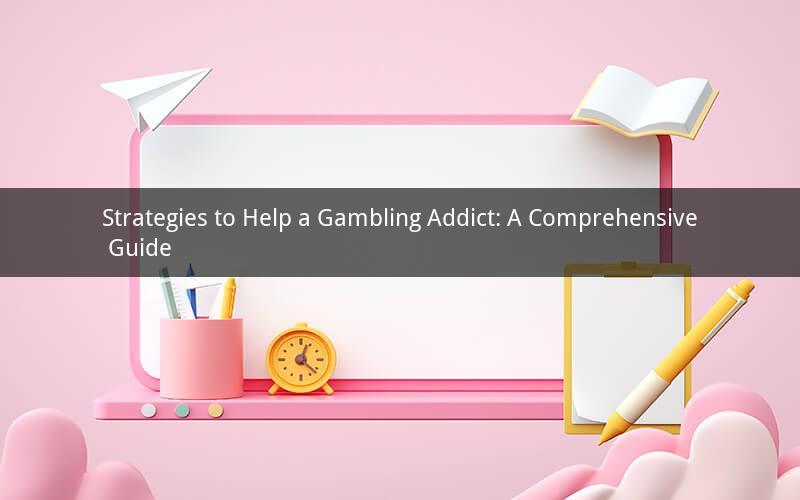
Introduction:
Gambling addiction is a serious issue that affects millions of people worldwide. It can lead to financial, emotional, and social problems, not only for the addict but also for their loved ones. If you know someone struggling with gambling addiction, it's crucial to understand how to help them. This article provides a comprehensive guide on strategies to assist a gambling addict in their journey towards recovery.
1. Educate Yourself:
Understanding the nature of gambling addiction is the first step in helping someone with this problem. Educate yourself about the signs, symptoms, and consequences of gambling addiction. This knowledge will enable you to recognize the problem and approach the situation with empathy and support.
2. Encourage Open Communication:
Create a safe and non-judgmental environment for the addict to express their feelings and concerns. Encourage them to share their struggles with you and listen actively without interrupting or getting defensive. Open communication fosters trust and allows the addict to feel supported during their recovery process.
3. Support Professional Help:
Encourage the addict to seek professional help from a therapist or counselor specializing in gambling addiction. A professional can provide personalized treatment plans, coping strategies, and support throughout the recovery journey. Support the addict in attending therapy sessions and follow-up appointments.
4. Develop a Support System:
Encourage the addict to surround themselves with supportive individuals who understand and care about their recovery. This may include family members, friends, or support groups dedicated to helping those with gambling addiction. A strong support system can provide emotional support, encouragement, and accountability.
5. Financial Management:
Gambling addiction often leads to financial problems. Help the addict address their financial situation by creating a budget, tracking expenses, and seeking financial counseling if necessary. Consider involving a trusted friend or family member to help manage their finances temporarily to prevent further financial strain.
6. Establish Boundaries:
Set clear boundaries to protect the addict from relapse. This may involve limiting access to gambling opportunities, removing credit cards, or establishing a no-gambling zone in the household. Boundaries help create a conducive environment for recovery and reduce the temptation to gamble.
7. Encourage Healthy Lifestyle Choices:
Promote a healthy lifestyle that includes regular exercise, a balanced diet, and adequate sleep. These factors contribute to overall well-being and can help alleviate stress, anxiety, and other emotions that may trigger gambling cravings.
8. Patience and Understanding:
Recovery from gambling addiction is a gradual process that requires patience and understanding. Avoid pressuring the addict to quit gambling immediately or becoming frustrated with setbacks. Celebrate small victories and milestones along the way to maintain motivation and encourage continued progress.
9. Encourage Self-Reflection:
Encourage the addict to engage in self-reflection and explore the underlying causes of their gambling addiction. Understanding the root causes can help address any underlying issues and prevent relapse. This process may involve therapy or self-help books focused on self-discovery and personal growth.
10. Be a Role Model:
Demonstrate healthy behaviors and attitudes towards gambling. Avoid engaging in risky gambling activities or discussing gambling excessively in the addict's presence. Being a positive role model can inspire the addict to make healthier choices and reinforce their commitment to recovery.
Q1: How can I help a gambling addict recognize they have a problem?
A1: Encourage open communication, express your concerns without judgment, and provide educational resources about gambling addiction. Help them understand the consequences of their behavior and encourage them to seek professional help.
Q2: What support groups are available for gambling addicts?
A2: Several support groups exist for gambling addicts, including Gamblers Anonymous and SMART Recovery. These groups provide a safe space for individuals to share their experiences, receive support, and learn coping strategies.
Q3: How can I help a gambling addict manage their finances during recovery?
A3: Assist them in creating a budget, tracking expenses, and seeking financial counseling if necessary. Consider involving a trusted friend or family member to help manage their finances temporarily to prevent further financial strain.
Q4: Can a gambling addict recover without professional help?
A4: While some individuals may recover without professional help, seeking support from therapists, counselors, or support groups can significantly improve the chances of successful recovery. Professional help provides personalized treatment plans, coping strategies, and ongoing support.
Q5: How can I maintain my own mental health while supporting a gambling addict?
A5: Take care of your own mental health by seeking support, engaging in self-care activities, and setting boundaries. Consider joining a support group for family members or friends of gambling addicts to share experiences and learn coping strategies. Remember, taking care of yourself is crucial for providing effective support to the addict.